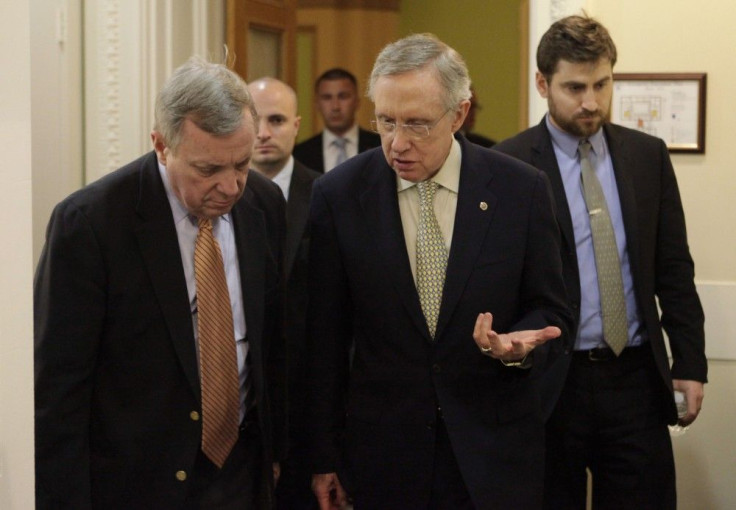Debt Talks: Reid Modifies Plan to Win GOP Support
Analysis

With less than four days until a U.S. Government default, Senate Democrats worked at an intense pace Saturday to try to forge a new, modified debt deal plan that would be agreeable to both Senate Republicans and at least a majority in the House.
The plan is not likely to win much support from the very Conservative Tea Party faction of the GOP in the House, who appear to be determined to vote against any increase in the debt ceiling -- a requirement if the U.S. is to avoid a credit market-constraining and U.S./global economy-slowing default.
On Friday, House Speaker John Boehner, R-Ohio, despite repeated Senate and White House letters that his Tea Party-modified debt plan, which called for a balanced budget amendment, was "dead-on-arrival" in the Democrat-led Senate and a waste of precious crisis time, narrowly won House approval for his modified plan.
And, as expected, it was quickly shot down in the Senate, The Washington Post reported Saturday.
Hence, as a political statement to its coalition, the Tea Party won: it signaled to the faction's political base that the Tea Party has remained true to its platform to seek a substantial reduction in federal spending and not vote for a plan that had a tax increase or even a revenue increase via tax reform. However, as a document that averts a possible financial calamity, it was a waste of time, policy analysts inside the beltway almost universally agree. It did nothing to achieve governance of the nation, and only served to eliminate one more day from a calendar that's growing very short.
Senate Now Becomes Focus
U.S. Senator Harry Reid, D-Nev. and Senate Majority Leader, will now try to woo Senate Republican support for a new version of his debt deal plan he introduced late Friday: a vote on the Reid plan could come as early as Sunday morning.
The biggest change in Reid's plan? Reid, borrowing an idea from Senate Minority Leader Mitch McConnell, R-Ky., would enable President Barack Obama to request a $2.4 trillion debt limit increase in two installments of $1.2 trillion each, thehill.com reported Saturday. The requests would be subject to Congressional resolutions of disapproval, but these would do little to restrict the president.
Obama could also veto any resolution, and it would take a two-thirds vote in both chambers of Congress to override the President.
Reid has so far attracted minimal Senate Republican support to his revised plan, but Friday evening he did file a motion to end a GOP filibuster, which would set up a vote for early Sunday morning, thehill.com reported.
Congress needs to raise the debt ceiling by Aug. 2, when the federal government both runs out of money and loses the authority to borrow more money.
A U.S. Government default -- or even the hint of it -- would force institutional investors to "price-in" the increased risk -- i.e. increase the interest rate it asks to hold U.S. debt.
Further, because the U.S. Government is considered the lowest risk in the world -- those higher interest rate increases - or increased risk -- would ripple through the financial system -- pushing up interest rates on everything from home mortgages, to car loans, to credit cards and student loans -- among other destructive consequences.
Political/Public Policy Analysis: Reid has to formulate a plan that is both agreeable to moderate Senate Republicans and can attract enough House Republicans (non-Tea Party members) to pass the House. But as they say -- first things first: the Senate vote is the next, key data point in the saga.
At this stage, it appears a Republican Senate filibuster is likely. One would like to think that Reid could attract seven moderate Republican Senators to make the 60 votes needed to invoke cloture and end a filibuster -- U.S. Sen. Scott Brown, R-Mass., said he will vote for Reid's revised plan - but if the impasse's "brinksmanship mentality" prevails, Senate Republicans will probably remain united enough to block Reid's plan with a filibuster.
If that occurs, that would mean two plans will have been defeated by opposition parties -- hardly progress toward a resolution, but the "each side defeated" reality could set the stage for bipartisan negotiations, at the 11th hour.
Based on the unlikelihood of Reid's revised plan winning Senate approval, we're keeping the risk barometer of the likelihood of a U.S. Government default, on a scale of 0 to 100 percent, at 60 percent on Saturday afternoon, the same as it was on Friday night.
© Copyright IBTimes 2024. All rights reserved.











